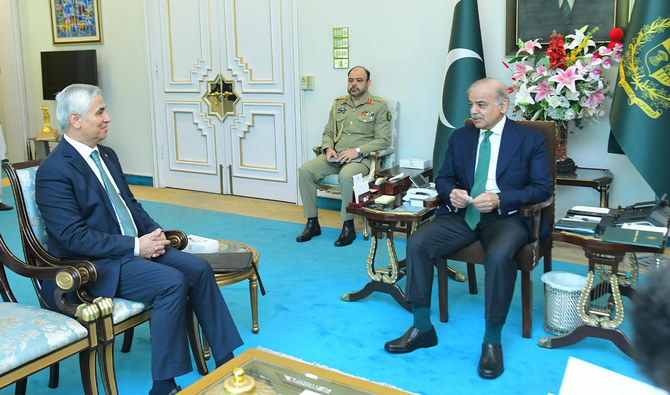ISLAMABAD: Prime Minister Shehbaz Sharif on Thursday reaffirmed Pakistan’s commitment to extend its “full support” to the Economic Cooperation Organization (ECO) as Islamabad eyes greater regional connectivity and trade to sustain its fragile economy.
Founded by Pakistan, Iran and Turkiye in 1964, the ECO describes itself as one of the oldest intergovernmental organizations that seeks to improve regional connectivity and enhance economic cooperation for countries in West, South and Central Asia.
Sharif met the ECO’s outgoing Secretary-General Khusrav Noziri in Islamabad on Thursday during which the two spoke about Noziri’s contributions to the regional platform.
“The Prime Minister reaffirmed his commitment that Pakistan would continue to lend its full support to ECO in enhancing intra-regional trade among ECO countries as well as on the ECO reforms agenda,” a statement from Sharif’s office said.
Sharif said Pakistan was proud that the incoming ECO secretary-general was Dr. Asad Majeed Khan, Pakistan’s former foreign secretary.
“The secretary-general conveyed his gratitude for Pakistan’s consistent support to him during his tenure as secretary-general ECO,” the Prime Minister’s Office (PMO) said.
PAKISTAN’S INVESTMENT, CONNECTIVITY PUSH
Pakistan has recently sought to forge deeper trade and economic ties with Central Asian countries. There has been a flurry of recent visits, investment talks and economic activity between Pakistan and these Central Asian countries, including meetings of top Pakistani officials with the leaders from Uzbekistan and Azerbaijan.
Located in a landlocked but resource-rich region, Central Asian countries need better access to regional markets including Pakistan, China, India and countries of West Asia. Meanwhile, Islamabad is seeking to bolster trade and investment ties with allies to stabilize its fragile $350 billion economy as it faces an acute balance of payment crisis amid soaring inflation and rising external debt.
It hopes to achieve this by positioning itself as a trade and transit hub connecting Central Asian countries to other parts of the world. Pakistan recently offered Central Asian states to become part of the China-Pakistan Economic Corridor project, under which Beijing has pledged around $65 billion in energy, infrastructure and other projects in Pakistan
Pakistan is seeking to enhance its foreign exchange reserves and bolster its economy as it tries to cut reliance on international financial institutions such as the International Monetary Fund (IMF) whose financial bailout packages come at a heavy cost for Islamabad.
Sharif has repeatedly said his government wants mutually rewarding partnerships, not just loans, from regional allies.
















